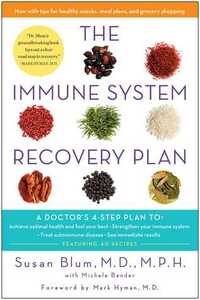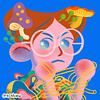Take a photo of a barcode or cover
16 reviews for:
The Immune System Recovery Plan: A Doctor's 4-Step Program to Treat Autoimmune Disease
Susan Blum
16 reviews for:
The Immune System Recovery Plan: A Doctor's 4-Step Program to Treat Autoimmune Disease
Susan Blum
This book is okay. While my personal experience is that diet does have a major impact on health, it doesn't follow that eating gluten is the root cause of all autoimmune diseases. Putting patients on elimination diets is great, but there are also people who just have messed up health and there's no magic bullet. Nor is it great to take a million supplements. There are some good recipes in the book and its worth a look, but I don't think the anti-gluten movement is fully researched.
Thorough overview of the major autoimmune disorders and awesome tips on how to maximize the healing potential of any body fighting one of these often misunderstood diseases.
hopeful
informative
medium-paced
Uses science and a real protocol to empower people to improve or heal autoimmune disease. Great book for everyone not just the sick.
A must-read for anyone dealing with an autoimmune disease, or if you’re genetically predisposed and looking to prevent a diagnosis. Dr. Blum gives hope to those facing tough conditions, showing step-by-step how you can heal and even reverse formerly “incurable” conditions.
Excellent book! This book was recommended (prescribed) to me by my doctor who is helping me with a hashimotos diagnosis and hormonal imbalances.
I highly recommend this book for anyone dealing with autoimmune issues: thyroid, arthritis, sjogren's, Multiple sclerosis, lupus, celiac, etc... Heck, if you feel like you could/should be feeling better health-wise, I recommend this book. There is so much we can do ourselves to be healthy and this book lays out the how's and why's to do that without having to resort to harsh medications with numerous harmful side effects.
I highly recommend this book for anyone dealing with autoimmune issues: thyroid, arthritis, sjogren's, Multiple sclerosis, lupus, celiac, etc... Heck, if you feel like you could/should be feeling better health-wise, I recommend this book. There is so much we can do ourselves to be healthy and this book lays out the how's and why's to do that without having to resort to harsh medications with numerous harmful side effects.
informative
slow-paced
informative
I'm done with this. Like not in a "got to the end of the book" way but in a "fed up with nonsense" way. The really frustrating part is that there is some reasonably sound medical advice here, but it's surrounded on all sides by "functional medicine" nonsense and woo woo unscientific theories. Instead of consulting this book, perhaps just visit the Mayo Clinic's website or the National Institutes of Health's website for scientifically-vetted evidence based medicine.
I was recently diagnosed with another autoimmune disease so I thought heck why not try this book. But one of my most recent non-fiction reads was [b:Do You Believe in Magic?: The Sense and Nonsense of Alternative Medicine|16065621|Do You Believe in Magic? The Sense and Nonsense of Alternative Medicine|Paul A. Offit|https://d.gr-assets.com/books/1411945153s/16065621.jpg|21856264], I've been re-listening to old episodes of Sawbones, and mainlining the alternative medicine episodes of Oh No Ross & Carrie, so my brain is definitely attuned to pseudoscience lingo. This book has it in spades.
In addition to the podcasts, websites, & books above, instead of reading this book I recommend reading about functional medicine at Science Based Medicine and in particular the piece Functional Medicine: The Ultimate Misnomer in the World of Integrative Medicine.
I was recently diagnosed with another autoimmune disease so I thought heck why not try this book. But one of my most recent non-fiction reads was [b:Do You Believe in Magic?: The Sense and Nonsense of Alternative Medicine|16065621|Do You Believe in Magic? The Sense and Nonsense of Alternative Medicine|Paul A. Offit|https://d.gr-assets.com/books/1411945153s/16065621.jpg|21856264], I've been re-listening to old episodes of Sawbones, and mainlining the alternative medicine episodes of Oh No Ross & Carrie, so my brain is definitely attuned to pseudoscience lingo. This book has it in spades.
In addition to the podcasts, websites, & books above, instead of reading this book I recommend reading about functional medicine at Science Based Medicine and in particular the piece Functional Medicine: The Ultimate Misnomer in the World of Integrative Medicine.
This book is phenomenal. I’ve been reading several books on healing autoimmune disease through a holistic and natural approach, and this is by far the BEST and most well-researched book on the subject. Not only are there several helpful assessments and tier levels of treatment based on symptoms, but Dr. Susan Blum did a very thorough job of addressing all of the underlying issues for autoimmune disease (leaky gut, adrenal fatigue, stress, diet, heavy metals, toxins, underperforming liver, and previous infections). This book also has the best layout I’ve seen on how to do an elimination diet!
I love love love the fact that food as medicine is the foundation for healing in this book as well as additional supplements to assist in detoxing and recovery. It even includes several recipes for each step of the treatment plan- recipes that are relatively affordable and easy to make! (I’ve found in a lot of these books the writers tend to fail to understand the fatigue that comes with autoimmune disease and outline a protocol that is very difficult to follow). It’s a very refreshing read in the face of Western medicine’s approach of endless prescriptions for symptoms themselves instead of the body as a whole.
HIGHLY RECOMMENDED for anyone, or anyone who has a loved one, in any stage of autoimmune disease. That being said, this book did take me several months to read since I wanted to be thorough as it has a lot of information that is very technical in explaining the biology of everything. I also took lots of notes and made lists of different foods to include in my diet. However, it wasn’t difficult to understand, just a dense- and outstanding- read.
I love love love the fact that food as medicine is the foundation for healing in this book as well as additional supplements to assist in detoxing and recovery. It even includes several recipes for each step of the treatment plan- recipes that are relatively affordable and easy to make! (I’ve found in a lot of these books the writers tend to fail to understand the fatigue that comes with autoimmune disease and outline a protocol that is very difficult to follow). It’s a very refreshing read in the face of Western medicine’s approach of endless prescriptions for symptoms themselves instead of the body as a whole.
HIGHLY RECOMMENDED for anyone, or anyone who has a loved one, in any stage of autoimmune disease. That being said, this book did take me several months to read since I wanted to be thorough as it has a lot of information that is very technical in explaining the biology of everything. I also took lots of notes and made lists of different foods to include in my diet. However, it wasn’t difficult to understand, just a dense- and outstanding- read.
I wanted so much to love this book. I'm the perfect target audience. I have many of the medical conditions, believe in the diet changes, am into alternative and holistic medicine, and already understand the link to toxins the author talks about at length. I was hoping for a book that would explain the science behind autoimmune disease and connect it to the rest. That's not this book.
I don't know if the author has farmed out sections to others and didn't check them well enough, or if she really is that ignorant about things. But there were so many huge glaring errors (big stuff too, not just small things) that it meant I couldn't trust the rest of the book. If I find mistakes in the stuff I already know, how can I tell if the stuff I don't know is correct?
Here are 3 errors I remember off the top of my head.
1) She claims that our diets are problematic because we're eating agricultural products vs hunting and gathering. Okay, there are some valid arguments for that and I can go with it. The error was when she said we (humans) have only changed over to farming 10 generations ago. Ummm, that's about 250 years. So, nope. That's the small error (maybe she meant millennia, but it's still the sort of thing an author (and her editor!) should catch).
2) Celiac Disease is an allergy to gluten. She said this twice that I saw. Not a simple typo. And not the sort of over-simplification that is acceptable in a book about autoimmune disease.
3) In talking about how gluten can be problematic for many (she implies all, which I don't agree with), she blames it all on GMOs. Now, I'm no fan of GMOs and I'm open to any science that shows they create problems in human health. Does she provide that? Nope. She says the reason they cause problems with wheat is that GMO wheat has "more gluten" than regular wheat and that eating more gluten is leading to medical issues.
Oh my God, where do I start? First of all, while GMO wheat exists, it's not yet on the market (as of last year anyway, source Wikipedia). Blum uses William David, author of Wheat Belly, as a source in this chapter and even he has a blog post out saying (in 2012) "While current research efforts continue to work on genetically-modified wheat, e.g., herbicide-resistance and reduction of celiac disease-provoking sequences, such GM-wheat is not currently on the market."
Second, the purpose of GMO wheat is not to increase the gluten content, nor does it as a side effect. Third, I've seen zero evidence anywhere eating a somewhat higher amount of gluten than the usual American is going to make any difference whatsoever.
I skimmed the rest of the book hoping there might be useful information there. Not really. The vast majority of it is quizzes to determine if particular types of treatments are useful to you (and they weren't very insightful quizzes either) and recipes for healthy foods (by her definition, though I didn't have a problem with her version of healthy diets).
All in all, this book was a huge disappointment.
I don't know if the author has farmed out sections to others and didn't check them well enough, or if she really is that ignorant about things. But there were so many huge glaring errors (big stuff too, not just small things) that it meant I couldn't trust the rest of the book. If I find mistakes in the stuff I already know, how can I tell if the stuff I don't know is correct?
Here are 3 errors I remember off the top of my head.
1) She claims that our diets are problematic because we're eating agricultural products vs hunting and gathering. Okay, there are some valid arguments for that and I can go with it. The error was when she said we (humans) have only changed over to farming 10 generations ago. Ummm, that's about 250 years. So, nope. That's the small error (maybe she meant millennia, but it's still the sort of thing an author (and her editor!) should catch).
2) Celiac Disease is an allergy to gluten. She said this twice that I saw. Not a simple typo. And not the sort of over-simplification that is acceptable in a book about autoimmune disease.
3) In talking about how gluten can be problematic for many (she implies all, which I don't agree with), she blames it all on GMOs. Now, I'm no fan of GMOs and I'm open to any science that shows they create problems in human health. Does she provide that? Nope. She says the reason they cause problems with wheat is that GMO wheat has "more gluten" than regular wheat and that eating more gluten is leading to medical issues.
Oh my God, where do I start? First of all, while GMO wheat exists, it's not yet on the market (as of last year anyway, source Wikipedia). Blum uses William David, author of Wheat Belly, as a source in this chapter and even he has a blog post out saying (in 2012) "While current research efforts continue to work on genetically-modified wheat, e.g., herbicide-resistance and reduction of celiac disease-provoking sequences, such GM-wheat is not currently on the market."
Second, the purpose of GMO wheat is not to increase the gluten content, nor does it as a side effect. Third, I've seen zero evidence anywhere eating a somewhat higher amount of gluten than the usual American is going to make any difference whatsoever.
I skimmed the rest of the book hoping there might be useful information there. Not really. The vast majority of it is quizzes to determine if particular types of treatments are useful to you (and they weren't very insightful quizzes either) and recipes for healthy foods (by her definition, though I didn't have a problem with her version of healthy diets).
All in all, this book was a huge disappointment.





